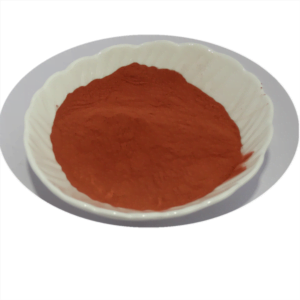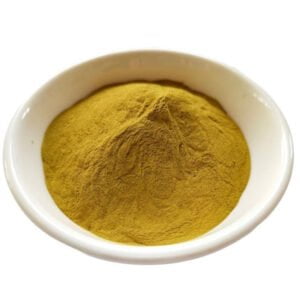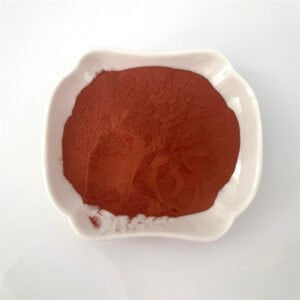fördelning av partikelstorlek
Innehållsförteckning
Översikt
Fördelning av partikelstorlek (PSD) spelar en avgörande roll i olika industrier, från läkemedel till metallurgi. Det påverkar materialens fysikaliska egenskaper och beteende, såsom flytbarhet, packningsdensitet och reaktionshastigheter. Att förstå PSD är viktigt för att optimera processer och förbättra produktkvaliteten. Den här guiden fördjupar sig i nyanserna av PSD och utforskar dess tillämpningar, fördelar och begränsningar, med särskilt fokus på metallpulver. Vi kommer också att ge en detaljerad jämförelse av specifika metallpulvermodeller, deras egenskaper och tillämpningar.
Introduktion till partikelstorleksfördelning
Partikelstorleksfördelning (PSD) avser mätningen av partiklarnas storlek inom ett givet prov. Det är en nyckelparameter för att förstå hur partiklar kommer att bete sig i en blandning, hur de kommer att packas ihop och hur de kommer att påverka materialets övergripande egenskaper. PSD är avgörande i industrier som läkemedel, keramik, metallurgi och livsmedelsproduktion.
Varför är PSD viktigt?
Tänk dig att baka en kaka med mjöl som har både fina och grova partiklar. Kakans konsistens skulle vara ojämn. På samma sätt säkerställer en enhetlig partikelstorlek i industriella processer konsistens och kvalitet. PSD påverkar olika materialegenskaper såsom:
- Flytbarhet: Hur lätt partiklar flyter påverkar tillverkning och förpackning.
- Packningstäthet: Påverkar materialstyrka och stabilitet.
- Reaktivitet: Mindre partiklar har ett större förhållande mellan ytarea och volym, vilket påverkar reaktionshastigheterna.
Mättekniker
Flera tekniker används för att mäta PSD, inklusive:
- Analys av siktar: Enkel och flitigt använd för större partiklar.
- Laserdiffraktion: Noggrann för ett brett spektrum av partikelstorlekar.
- Dynamisk ljusspridning (DLS): Bäst för partiklar i nanostorlek.
- Sedimentationstekniker: Baserat på partikelavsättningshastigheter i en vätska.
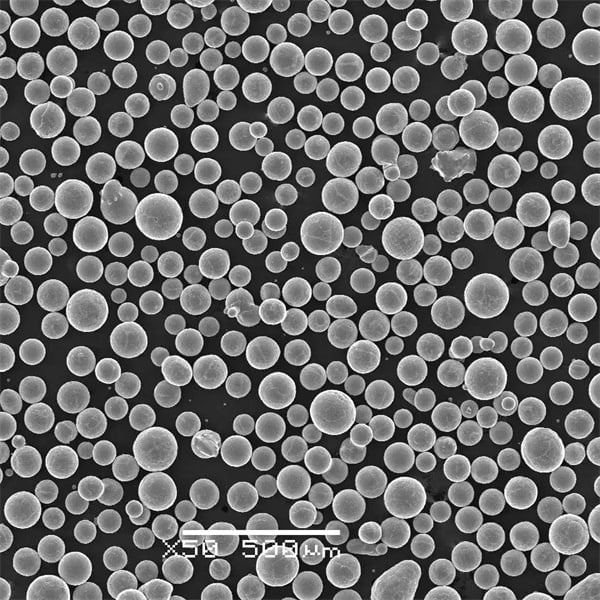
Förstå metallpulvermodeller
I metallurgins värld är PSD särskilt betydelsefullt. Låt oss utforska specifika metallpulvermodeller, deras egenskaper och tillämpningar.
Järnpulver
Beskrivning: Järnpulver används flitigt inom pulvermetallurgi för att skapa olika komponenter på grund av dess magnetiska egenskaper och goda kompressibilitet.
| Fastighet | Beskrivning |
|---|---|
| Typ | Reducerad, finfördelad |
| Sammansättning | Rent järn eller legerat |
| Partikelstorlek | 10-300 mikrometer |
| Tillämpningar | Bildelar, magnetiska material |
Aluminiumpulver
Beskrivning: Aluminiumpulver är känt för sin låga vikt och korrosionsbeständighet och används inom pyroteknik, rymdindustri och additiv tillverkning.
| Fastighet | Beskrivning |
|---|---|
| Typ | Finfördelad, flaga |
| Sammansättning | Ren aluminium |
| Partikelstorlek | 5-200 mikron |
| Tillämpningar | 3D-utskrift, fyrverkerier, färger |
Kopparpulver
Beskrivning: Kopparpulver är uppskattat för sin elektriska ledningsförmåga och används ofta i elektronik och ledande bläck.
| Fastighet | Beskrivning |
|---|---|
| Typ | Elektrolytisk, finfördelad |
| Sammansättning | Ren koppar eller legeringar |
| Partikelstorlek | 10-100 mikrometer |
| Tillämpningar | Elektriska komponenter, lödning |
Titanpulver
Beskrivning: Titanpulver är uppskattat för sin styrka, låga densitet och biokompatibilitet, vilket gör det idealiskt för rymd- och medicinska implantat.
| Fastighet | Beskrivning |
|---|---|
| Typ | Hydrid-dehydrid, finfördelad |
| Sammansättning | Rent titan eller legeringar |
| Partikelstorlek | 15-200 mikron |
| Tillämpningar | Delar till flyg- och rymdindustrin, medicinska implantat |
Nickelpulver
Beskrivning: Nickelpulver används i batterier, katalysatorer och superlegeringar på grund av dess höga smältpunkt och korrosionsbeständighet.
| Fastighet | Beskrivning |
|---|---|
| Typ | Karbonyl, elektrolytisk |
| Sammansättning | Rent nickel eller legeringar |
| Partikelstorlek | 5-50 mikrometer |
| Tillämpningar | Batterier, superlegeringar, katalysatorer |
Pulver av rostfritt stål
Beskrivning: Pulver av rostfritt stål används i additiv tillverkning och pulvermetallurgi för att skapa robusta, korrosionsbeständiga komponenter.
| Fastighet | Beskrivning |
|---|---|
| Typ | Atomiserad |
| Sammansättning | Olika rostfria stålkvaliteter |
| Partikelstorlek | 10-150 mikrometer |
| Tillämpningar | 3D-utskrift, strukturella delar |
Kobolt-krom pulver
Beskrivning: Kobolt-krompulver är känt för sin slitstyrka och höga temperaturprestanda och används i dentala och ortopediska implantat.
| Fastighet | Beskrivning |
|---|---|
| Typ | Atomiserad |
| Sammansättning | Co-Cr legering |
| Partikelstorlek | 10-100 mikrometer |
| Tillämpningar | Medicinska implantat, högtemperaturkomponenter |
Volframpulver
Beskrivning: Volframpulver används vid tillverkning av hårdmetaller och tungmetallegeringar på grund av dess höga densitet och smältpunkt.
| Fastighet | Beskrivning |
|---|---|
| Typ | Nedsatt |
| Sammansättning | Ren volfram |
| Partikelstorlek | 1-50 mikron |
| Tillämpningar | Hårda metaller, strålskydd |
Zinkpulver
Beskrivning: Zinkpulver används för galvanisering, i batterier och som reduktionsmedel i olika kemiska processer.
| Fastighet | Beskrivning |
|---|---|
| Typ | Atomiserad |
| Sammansättning | Ren zink |
| Partikelstorlek | 5-200 mikron |
| Tillämpningar | Galvanisering, batterier, kemiska reaktioner |
Brons pulver
Beskrivning: Bronspulver, en legering av koppar och tenn, används i lager, bussningar och konstmaterial på grund av dess goda friktionsegenskaper och estetiska tilltalande.
| Fastighet | Beskrivning |
|---|---|
| Typ | Atomiserad |
| Sammansättning | Cu-Sn-legering |
| Partikelstorlek | 10-100 mikrometer |
| Tillämpningar | Lager, bussningar, skulpturer |
Tillämpningar av Fördelning av partikelstorlek
Partikelstorleksfördelning påverkar en mängd olika tillämpningar inom olika branscher:
Läkemedel
PSD påverkar läkemedlets löslighet och biotillgänglighet. Fina partiklar löses upp snabbare, vilket leder till snabbare absorption och verkan.
Kosmetika
I kosmetika påverkar PSD textur, täckning och hudkänsla. Finare partiklar ger mjukare produkter och bättre applicering.
Metallurgi
PSD bestämmer sintringsbeteendet och slutliga egenskaper hos metalldelar. Enhetlig partikelstorlek säkerställer konsekvent densitet och styrka.
Livsmedelsindustrin
PSD påverkar konsistensen, smaken och stabiliteten hos livsmedelsprodukter. Till exempel gör fina kakaopartiklar slätare choklad.
Keramik
I keramik påverkar PSD packningsdensiteten och sintringsbeteendet, vilket påverkar slutproduktens styrka och hållbarhet.
Färger och ytbeläggningar
PSD bestämmer täckning, finish och hållbarhet för färger och beläggningar. Fina partiklar ger mjukare finish och bättre täckning.
Flyg- och rymdindustrin samt fordonsindustrin
Inom flyg- och bilindustrin är PSD av metallpulver avgörande för att producera högpresterande, lätta komponenter.
Fördelar med partikelstorleksfördelning
Förbättrad prestanda
Enhetlig partikelstorlek förbättrar produkternas prestanda och tillförlitlighet. Till exempel, i batterier, leder konsekvent PSD till bättre elektriska egenskaper.
Förbättrad processbarhet
Material med kontrollerat PSD flödar bättre och är lättare att bearbeta, vilket minskar produktionskostnaderna och förbättrar effektiviteten.
Konsekvent kvalitet
Kontrollerad PSD säkerställer konsekvent produktkvalitet, minskar variationen och ökar kundnöjdheten.
Bättre reaktivitet
Mindre partiklar med större yta reagerar snabbare, vilket är fördelaktigt i kemiska processer och katalys.
Optimerad packningsdensitet
Uniform PSD möjliggör bättre packningstäthet, vilket är avgörande inom pulvermetallurgi och keramik.
Nackdelar med Fördelning av partikelstorlek
Komplex mätning
Att mäta PSD exakt kan vara komplext och kräver sofistikerad utrustning och teknik.
Höga kostnader
Att producera och kontrollera enhetlig PSD kan vara dyrt, särskilt för högprecisionstillämpningar.
Processkänslighet
Vissa processer är mycket känsliga för PSD, vilket kräver strikt kontroll för att undvika defekter och kvalitetsproblem.
Miljöpåverkan
Vissa metoder för att framställa fina pulver kan ha miljöpåverkan på grund av energiförbrukning och avfallsgenerering.
Hantering av utmaningar
Fina pulver med smal PSD kan innebära hanteringsutmaningar, såsom dammbildning och flödesproblem.
Jämförande analys av metallpulver
Låt oss jämföra olika metallpulver baserat på olika parametrar för att hjälpa dig göra ett välgrundat val.
| Metallpulver | Fördelar | Nackdelar | Tillämpningar |
|---|---|---|---|
| Järnpulver | Hög kompressibilitet, magnetiska egenskaper | Benägen att oxidera | Bildelar, magnetiska material |
| Aluminiumpulver | Lättvikt, korrosionsbeständig | Mycket reaktiv, speciellt i pulverform | Flyg, 3D-utskrift, pyroteknik |
| Kopparpulver | Utmärkt elektrisk ledningsförmåga | Benägen till oxidation, relativt dyr | Elektriska komponenter, ledande bläck |
| Titanpulver | Högt förhållande mellan styrka och vikt, biokompatibel | Dyrt, svårt att bearbeta | Medicinska implantat, delar till flyg- och rymdindustrin |
| Nickelpulver | Hög smältpunkt, korrosionsbeständig | Dyra, miljöhänsyn med produktionen | Batterier, superlegeringar, katalysatorer |
| Pulver av rostfritt stål | Korrosionsbeständig, mångsidig | Kan vara dyrt, tungt | Additiv tillverkning, konstruktionsdelar |
| Kobolt-krom pulver | Slitstark prestanda vid hög temperatur | Dyrt, svårt att bearbeta | Tandimplantat, ortopediska implantat |
| Volframpulver | Extremt hög smältpunkt, tät | Mycket tung, svår att bearbeta | Hårda metaller, strålskydd |
| Zinkpulver | Bra korrosionsbeständighet, billig | Dåliga mekaniska egenskaper | Galvanisering, batterier, kemiska processer |
| Brons pulver | Bra friktionsegenskaper, estetiskt tilltalande | Relativt dyrt | Lager, bussningar, skulpturer |
Specifikationer, storlekar, kvaliteter och standarder
Att förstå specifikationer, storlekar, kvaliteter och standarder är avgörande för att välja rätt metallpulver för din applikation.
Järnpulver
| Specifikation | Värde |
|---|---|
| Betyg | ASC100.29, ASC200 |
| Partikelstorleksintervall | 10-300 mikrometer |
| Standard | ASTM B783, ISO 4497 |
| Renhet | ≥ 99.5% Fe |
Aluminiumpulver
| Specifikation | Värde |
|---|---|
| Betyg | 6061, 7075 |
| Partikelstorleksintervall | 5-200 mikron |
| Standard | ASTM B209, ISO 8067 |
| Renhet | ≥ 99,71 TP3T Al |
Kopparpulver
| Specifikation | Värde |
|---|---|
| Betyg | Elektrolytisk, atomiserad |
| Partikelstorleksintervall | 10-100 mikrometer |
| Standard | ASTM B216, ISO 8951 |
| Renhet | ≥ 99,9% Cu |
Titanpulver
| Specifikation | Värde |
|---|---|
| Betyg | Klass 1, klass 2, klass 5 (Ti-6Al-4V) |
| Partikelstorleksintervall | 15-200 mikron |
| Standard | ASTM F67, ISO 5832-2 |
| Renhet | ≥ 99.5% Ti |
Nickelpulver
| Specifikation | Värde |
|---|---|
| Betyg | Karbonyl, elektrolytisk |
| Partikelstorleksintervall | 5-50 mikrometer |
| Standard | ASTM B329, ISO 6284 |
| Renhet | ≥ 99,8% Ni |
Pulver av rostfritt stål
| Specifikation | Värde |
|---|---|
| Betyg | 304L, 316L, 17-4PH |
| Partikelstorleksintervall | 10-150 mikrometer |
| Standard | ASTM A276, ISO 4957 |
| Renhet | ≥ 99,5% |
Kobolt-krom pulver
| Specifikation | Värde |
|---|---|
| Betyg | CoCrMo, CoCrW |
| Partikelstorleksintervall | 10-100 mikrometer |
| Standard | ASTM F75, ISO 5832-12 |
| Renhet | ≥ 99,5% |
Volframpulver
| Specifikation | Värde |
|---|---|
| Betyg | W-1, W-2 |
| Partikelstorleksintervall | 1-50 mikron |
| Standard | ASTM B777, ISO 6847 |
| Renhet | ≥ 99.9% W |
Zinkpulver
| Specifikation | Värde |
|---|---|
| Betyg | Zn-0, Zn-1 |
| Partikelstorleksintervall | 5-200 mikron |
| Standard | ASTM B840, ISO 752 |
| Renhet | ≥ 99.5% Zn |
Brons pulver
| Specifikation | Värde |
|---|---|
| Betyg | CuSn8, CuSn10 |
| Partikelstorleksintervall | 10-100 mikrometer |
| Standard | ASTM B427, ISO 4381 |
| Renhet | ≥ 90% Cu |
Leverantörer och prisuppgifter
Att välja rätt leverantör och förstå prisdetaljer är avgörande för att säkerställa kvalitet och kostnadseffektivitet. Här är några ledande leverantörer och genomsnittliga priser för olika metallpulver.
Järnpulverleverantörer och prissättning
| Leverantör | Pris per kg |
|---|---|
| Höganäs AB | $5 – $8 |
| GKN Pulvermetallurgi | $4 – $7 |
| Rio Tinto Metallpulver | $5 – $9 |
Aluminiumpulverleverantörer och prissättning
| Leverantör | Pris per kg |
|---|---|
| Valimet Inc. | $10 – $15 |
| Toyal America, Inc. | $12 – $18 |
| Kymera International | $11 – $17 |
Kopparpulverleverantörer och prissättning
| Leverantör | Pris per kg |
|---|---|
| SCM Metallprodukter | $20 – $25 |
| Tillverkning av metallpulver | $22 – $28 |
| GGP Metalpowder AG | $21 – $27 |
Leverantörer och prissättning av titanpulver
| Leverantör | Pris per kg |
|---|---|
| AP&C (GE Additive) | $300 – $400 |
| TLS Teknik | $320 – $420 |
| Praxair Ytteknologi | $310 – $410 |
Nickelpulverleverantörer och prissättning
| Leverantör | Pris per kg |
|---|---|
| Vale | $50 – $60 |
| Norilsk Nickel | $52 – $62 |
| Jinchuan-gruppen | $51 – $61 |
Leverantörer av rostfritt stålpulver och prissättning
| Leverantör | Pris per kg |
|---|---|
| Carpenter Technology Corporation | $30 – $40 |
| Sandvik Materialteknik | $32 – $42 |
| Avancerad metallbearbetning | $31 – $41 |
Leverantörer och prissättning av kobolt-krompulver
| Leverantör | Pris per kg |
|---|---|
| ATI speciallegeringar och komponenter | $150 – $200 |
| HC Starck | $160 – $210 |
| Oerlikon Metco | $155 – $205 |
Tungsten Powder Leverantörer och prissättning
| Leverantör | Pris per kg |
|---|---|
| Global Tungsten & Powders Corp. | $200 – $250 |
| HC Starck Tungsten GmbH | $210 – $260 |
| Buffalo Tungsten Inc. | $205 – $255 |
Zinkpulverleverantörer och prissättning
| Leverantör | Pris per kg |
|---|---|
| Umicore | $5 – $7 |
| EverZinc | $6 – $8 |
| Toho Zinc Co., Ltd. | $5.5 – $7.5 |
Bronspulverleverantörer och prissättning
| Leverantör | Pris per kg |
|---|---|
| AMPAL, Inc. | $20 – $30 |
| SCM Metallprodukter | $22 – $32 |
| Belmont Metals | $21 – $31 |
För- och nackdelar med olika metallpulver
Att förstå fördelarna och nackdelarna med varje metallpulver kan hjälpa till att fatta ett välgrundat beslut.
Järnpulver
Proffs
- Hög kompressibilitet
- Goda magnetiska egenskaper
- Relativt billigt
Nackdelar
- Benägen att oxidera
- Begränsad prestanda vid hög temperatur
Aluminiumpulver
Proffs
- Lättvikt
- Korrosionsbeständig
- God termisk och elektrisk ledningsförmåga
Nackdelar
- Mycket reaktiv
- Dyrt för kvaliteter med hög renhet
Kopparpulver
Proffs
- Utmärkt elektrisk och termisk ledningsförmåga
- God korrosionsbeständighet
Nackdelar
- Benägen att oxidera
- Högre kostnad jämfört med andra metaller
Titanpulver
Proffs
- Högt förhållande mellan styrka och vikt
- Biokompatibel
- Utmärkt korrosionsbeständighet
Nackdelar
- Dyrt
- Svår att bearbeta och hantera
Nickelpulver
Proffs
- Hög smältpunkt
- Utmärkt korrosionsbeständighet
- Goda mekaniska egenskaper
Nackdelar
- Dyrt
- Miljöhänsyn i produktionen
Pulver av rostfritt stål
Proffs
- Korrosionsbeständig
- Mångsidig med olika kvaliteter
- Goda mekaniska egenskaper
Nackdelar
- Kan bli dyrt
- Tung jämfört med andra metaller
Kobolt-krom pulver
Proffs
- Hög slitstyrka
- Utmärkt prestanda vid höga temperaturer
- Biokompatibel
Nackdelar
- Mycket dyrt
- Hård
Volframpulver
Proffs
- Extremt hög smältpunkt
- Mycket tät
- Utmärkta strålskyddsegenskaper
Nackdelar
- Väldigt tung
- Svårt att bearbeta och tillverka
Zinkpulver
Proffs
- God korrosionsbeständighet
- Relativt billigt
- Lätt att bearbeta och hantera
Nackdelar
- Dåliga mekaniska egenskaper
- Begränsad styrka jämfört med andra metaller
Brons pulver
Proffs
- Bra friktionsegenskaper
- Estetiskt tilltalande
- Utmärkt slitstyrka
Nackdelar
- Relativt dyrt
- Begränsad användning jämfört med andra metaller
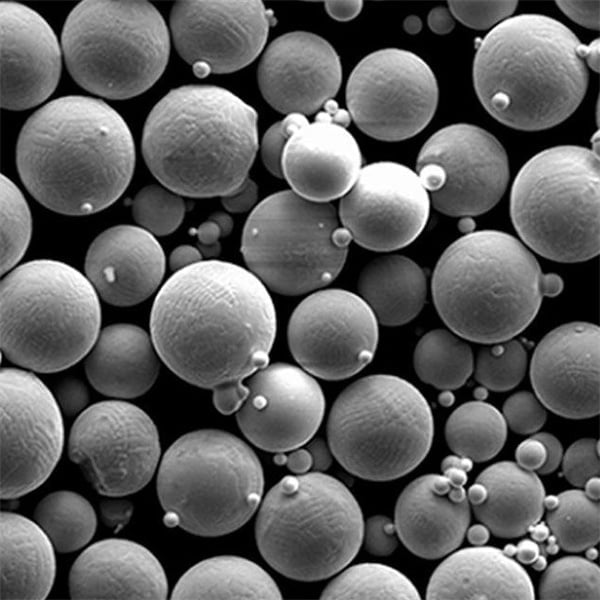
Vanliga frågor
Vad är partikelstorleksfördelning (PSD)?
Partikelstorleksfördelning hänvisar till intervallet av partikelstorlekar som finns i ett prov och deras relativa kvantiteter. Det är avgörande för att förstå hur partiklar kommer att bete sig i olika tillämpningar.
Varför är PSD viktigt i pulvermetallurgi?
Inom pulvermetallurgi påverkar PSD flytbarheten, packningsdensiteten och sintringsbeteendet hos metallpulver, vilket direkt påverkar kvaliteten och prestanda hos tillverkade komponenter.
Hur mäts partikelstorleksfördelningen?
PSD kan mätas med hjälp av tekniker som siktanalys, laserdiffraktion, sedimentering och dynamisk ljusspridning, beroende på partikelstorleksområdet och materialegenskaper.
Vilka är fördelarna med enhetlig partikelstorleksfördelning?
Uniform PSD säkerställer konsekvent produktkvalitet, förbättrad bearbetbarhet, förbättrade prestandaegenskaper och optimerade materialegenskaper i olika industriella applikationer.
Vilka är utmaningarna med att kontrollera partikelstorleksfördelningen?
Utmaningar inkluderar komplexiteten hos mättekniker, höga produktionskostnader för att uppnå smala PSD-intervall och processkänslighet för variationer i partikelstorlek.
Vilka industrier drar mest nytta av kontrollerad partikelstorleksfördelning?
Branscher som läkemedel, kosmetika, metallurgi, keramik, livsmedelsförädling och elektronik drar stor nytta av kontrollerad PSD på grund av dess inverkan på produktprestanda och tillverkningseffektivitet.
Slutsats
Partikelstorleksfördelning (PSD) är en kritisk aspekt av materialvetenskap och ingenjörskonst, som påverkar de fysikaliska och kemiska egenskaperna hos material inom olika industrier. Att förstå och kontrollera PSD är viktigt för att optimera processer, förbättra produktkvaliteten och uppnå önskade materialegenskaper. Den här guiden har gett en djupgående utforskning av PSD, med fokus på dess tillämpningar, fördelar och begränsningar, med en detaljerad jämförande analys av specifika metallpulver. Genom att utnyttja denna kunskap kan industrier fatta välgrundade beslut när det gäller att välja och använda metallpulver som bäst passar deras specifika krav och tillämpningar.
För ytterligare information om specifika produkter, detaljerade tekniska specifikationer eller leverantörsdetaljer, se respektive tillverkare eller industristandarder. Håll dig informerad och förnya med rätt partikelstorleksfördelning skräddarsydd efter dina behov.
Dela på
MET3DP Technology Co, LTD är en ledande leverantör av lösningar för additiv tillverkning med huvudkontor i Qingdao, Kina. Vårt företag är specialiserat på 3D-utskriftsutrustning och högpresterande metallpulver för industriella tillämpningar.
Förfrågan för att få bästa pris och anpassad lösning för ditt företag!
Relaterade artiklar

Högpresterande segment för munstycksvingar: Revolutionerande turbineffektivitet med 3D-utskrift i metall
Läs mer "Om Met3DP
Senaste uppdateringen
Vår produkt
KONTAKTA OSS
Har du några frågor? Skicka oss meddelande nu! Vi kommer att betjäna din begäran med ett helt team efter att ha fått ditt meddelande.

Metallpulver för 3D-printing och additiv tillverkning
FÖRETAG
PRODUKT
cONTACT INFO
- Qingdao City, Shandong, Kina
- [email protected]
- [email protected]
- +86 19116340731











